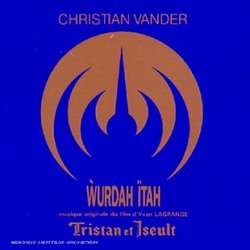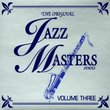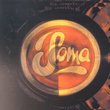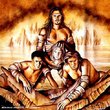| All Artists: Magma Title: Wurdah Itah Members Wishing: 3 Total Copies: 0 Release Date: 10/31/2006 Album Type: Import Genre: International Music Styles: Europe, Continental Europe Number of Discs: 1 SwapaCD Credits: 1 UPC: 3149025058386 |
Search - Magma :: Wurdah Itah
CD DetailsSimilar CDs
|
CD ReviewsGreat for relaxing after your next black mass W. T. Hoffman | Pennsylvania, United States | 09/26/2008 (5 out of 5 stars) "OF all the 1970s MAGMA albums, this album by far has the most martial rhythms, the most complex, atonal harmonic clusters, and the most frightening vocalizings. Anyone familiar with the MAGMA story, knows that this album, is the second movement of THEUSZ HAMTTAAHK, a three movement symphony, with Magma's undisputed masterpiece, MDK, named the third movement. When i ordered this CD, I had misgivings, and the price was only part of it. MDK is an incredibly complex, dense, richly orchestrated piece of music. When i read, that this album has a "skeletal crew" producing the music, I was not sure I'd really enjoy it, since I assumed the power of MAGMA's music, had something to do with the density of musical timbres, rythmic interplay, and choral stackings producing a polytonal, or atonal whole. Well, that's a mistaken point of view. With only two of the regulars on chant/vocals, the bass player, the piano player who is doubling up on vocals, and Christian on drums, a very complex, dense, intertwining piece of music has been composed here.There could be a LOT of overdubbing on this album at times, especially with the vocalizations, but it hardly matters. Personally, I find that the lack of sax, violin, guitar, etc, brings the piano work to the forefront of the soundstage of the album. Since the piano bridges the complexity of the polyrhythms and the harmonic density, hearing the piano so vividly helps to identify the musical ideals, and leitmotifs. This clarity of the piano, and its rhythm, is like a seat belt that keeps you strapped in, while so much keeps changing and morphing musically, so quickly. Some of the MDK musical themes make their appearance on this album first. This produces a powerful, emotional punch of recognition, when they reappear later on MDK, ie the third movement. Just as in a "real" symphony, hearing the repetition of leitmotif, with subtle permutations, is the payoff, for paying attention to a singular piece of music stretch between two (or three) seperate CDs. WURDAH ITAH doesnt work symphonically like a LARGO 2nd movement. Instead, WURDAH ITAH's slightly thinner orchrestrations work beautifully, in anticipation to the instrumentally dense intensity of MDK. Vander is not joking-- this is a singular peice of music, that builds thru WURDAH ITAH, and concludes like a supernova at the end of MDK. Side one is by far the darkest part of the composistion, supposedly representing on Earth, "THE TIME OF DARKNESS", which is going to be battled by the spiritually evolved people from Kobaia. And this musical conflict, between tonality and peace, and atonality and war, provides the musical plot to both albums. Dark, disharmonic musical themes, are interspliced by the nearly angelic vocals scream-chanted with manic intensity. Spoiler alert: the consonant harmonies win out over the evil, disharmonic clusters. The first part of Wurdah Itah ends on the 6th song. ( There's quite a pause between the 6th and 7th song.) Most of the themes one hears on the first half , are not noticable in the MDK album, so it isnt immediately clear WHY this LP is a second movement, to MDK's third movement. When the second half of WURDAH ITAH plays, you hear the crossover, around the beginning of the "WHERE IS THE MASTER?" song, towards the end of the album. Suddenly, familiar chords first begin to manifest their sound. At the end of the second movement, just like the end of the MDK album, ie 3rd movement, the shock of realization hits. The piano rhythm begins that is so familiar to fans of the MEKANIK KOMMANDOH section of MDK. And the waves of dynamics begin to inundate over you, waves of sound loud to soft to loud, as familar voices in the choir start to do their freak out singing, buiding the song, only to bring it back down to earth again. By this time, you ARE ready to jump right into the Third movement of THEUSZ HAMTTAAHK, ie, MDK, and hear the symphonic density, and intense emotions, play to their conclusion on that album. So, altho it is not as developed as MDK, I cannot say that Wurdah Itah is a lesser work. I accept it as part of the SAME WORK, the SAME SYMPHONIC PIECE. If i have any problem with WURDAH ITAH, is that it works so well as a "Second Movement", that I dont feel as if it stands completely on its own. The album ends with a fade out, at a place where you dont feel an organic closure to the album you just heard. My guess is that there were limitations with the LP format, that did not permit VANDER to bring this second movement, to a musical consonance. Its a shame, and altho I have not heard the live versions of all three movements played as a singular piece of music, I have no doubt that in a concert setting, that Wurdah Itah does not end, where it does on the album. This is a very small criticism. It matters when you want to hear the second and third movement consecutively, of THEUSZ HAMTTAAHK. As for what kind of music fan would enjoy this album, all I can say, is if you like MAGMA's pinacle of musicality from around 1973, ie MDK, you will also like this album. If the MAGMA sound you like, is found on their first two albums, the jazzier albums, then this is going to sound like Orff on acid to you. Some of the atonalities that ELP tried to explore on TARKUS, tho not successfully, are also in this part of MAGMA's work. But it's Vander, not Emerson, who discovered the real secret to composing sinister musical themes, to bring into battle against hopeful music. As for whether or not this is relaxing music, it's no more or less relaxing than King Crimson's RED or STARLESS AND BIBLE BLACK, or The Mothers of Invention's UNCLE MEAT, or BURNT WEANY SAMWICH. That is to say, its demanding music, filled with musical tension, which doesnt function as sonic wallpaper. Magma's best work, is every bit as strange, singular, and amazing, as the best work of Fripp or Zappa. And truly, WURDAH ITAH is a chunk of MAGMA's best work." ONE OF THE BEST ALBUMS I OWN. Lord Chimp | Monkey World | 12/06/2007 (5 out of 5 stars) "Magma's "zeuhl" music is a tough sell -- merging minimalist composition, opera, jazz, 20th century classical, and rock music sounds fine enough, but when it's so otherworldly and indiosyncratic one might be suspicious. This attitude will only result in missing some of the greatest music! _Wurdah Itah_ remains my favorite Magma masterpiece. Rather than the intense orchestral backdrops of, say, _Mekanik Destruktiv Kommandoh_, composer Christan Vander's focus here is stripped-down, clear sound groups. Gone is the all the brass, and the group is down to rather percussive basics, with only Christian Vander (voice, electric & acoustic piano, drums), Jannick Top (bass), and other vocalists Klaus Blasquiz and Rene Garber. Every great band has an album that seems to capture them are their most "hard"-core. _Wurdah Itah_ is that album for Magma. So while perhaps not as big as some other wonderful Magma releases like _Kohntarkosz_ or _MDK_, it captures them are their most pure. The music is like unlike almost anything and still stands apart from later groups who followed closely in their footsteps. Main qualities are make-up language, a stravinskian modernism, irregular rhythms, intense crescendos and militaristic rumbles of piano and bass and elated vox, and drums that show Vander is really an unheralded master of his craft. There is an ostensibly simplicity - vocal melodies are often confined to just three or four notes, and rhythms seem repetitious in nature, but these threads are manipulated, inverted and juxtaposed powerfully. It can be dark intensity to this but it's mostly emotionally invigorating. There is no austerity in this music despite its strangeness - I find it is beautifully intelligible and pleasant. There are very few albums in my collection more enjoyed than this. And just a final note: Magma is not really mentioned on this album, it's technically a Christian Vander release, and I guess it was some kind of soundtrack. But it is absolute Magma, I promise."
|




